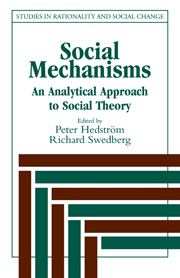Book contents
- Frontmatter
- Contents
- ACKNOWLEDGMENTS
- LIST OF CONTRIBUTORS
- 1 Social mechanisms: An introductory essay
- 2 Social mechanisms and social dynamics
- 3 A plea for mechanisms
- 4 Real virtuality
- 5 Concatenations of mechanisms
- 6 Do economists use social mechanisms to explain?
- 7 Social mechanisms of dissonance reduction
- 8 Social mechanisms without black boxes
- 9 Is sociological theory too grand for social mechanisms?
- 10 Theoretical mechanisms and the empirical study of social processes
- 11 Monopolistic competition as a mechanism: Corporations, universities, and nation-states in competitive fields
- 12 Rational imitation
- AUTHOR INDEX
- SUBJECT INDEX
6 - Do economists use social mechanisms to explain?
Published online by Cambridge University Press: 24 March 2010
- Frontmatter
- Contents
- ACKNOWLEDGMENTS
- LIST OF CONTRIBUTORS
- 1 Social mechanisms: An introductory essay
- 2 Social mechanisms and social dynamics
- 3 A plea for mechanisms
- 4 Real virtuality
- 5 Concatenations of mechanisms
- 6 Do economists use social mechanisms to explain?
- 7 Social mechanisms of dissonance reduction
- 8 Social mechanisms without black boxes
- 9 Is sociological theory too grand for social mechanisms?
- 10 Theoretical mechanisms and the empirical study of social processes
- 11 Monopolistic competition as a mechanism: Corporations, universities, and nation-states in competitive fields
- 12 Rational imitation
- AUTHOR INDEX
- SUBJECT INDEX
Summary
Introduction
In interpreting the question “Do economists use social mechanisms to explain? ” I focus on the phrase “social mechanisms” rather than on the word “explain. ” I take the explanatory status of economic science as given and ask whether that enterprise uses social mechanisms. I interpret social mechanisms (defined in greater detail later) as rational-choice accounts of how a specified combination of preferences and constraints can give rise to more complex social outcomes. As we shall see, social mechanisms cover a broader class of cases than do invisible hand mechanisms, a more familiar concept to many economists.
The concept of social mechanism holds importance for both rationalchoice sociologists and economists. In sociology the study of social mechanisms serves as a methodological competitor to both more atheoretical approaches and to grand theory building. Analyzing social mechanisms puts sociology firmly in the rational-choice camp and brings it closer to economics and public choice approaches to political science. In economics, a strongly unified discipline in methodological terms, explanation in terms of mechanisms is more widely accepted than in sociology. Nonetheless studying the method of social mechanisms has broader implications for how we think about markets, the epistemological status of economic science, comparing mathematical and nonmathematical approaches to eco nomics, the link between economics and rational-choice sociology, and some concrete problems in game theory. In this chapter, I hope to draw out some of these broader implications, although I do not seek to present definitive answers.
- Type
- Chapter
- Information
- Social MechanismsAn Analytical Approach to Social Theory, pp. 125 - 146Publisher: Cambridge University PressPrint publication year: 1998
- 17
- Cited by



